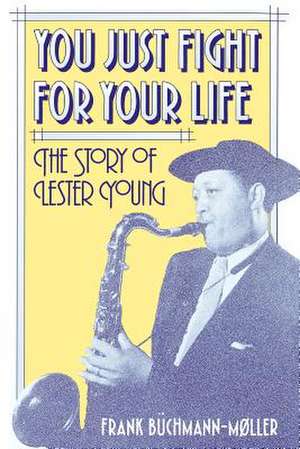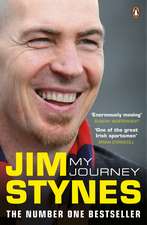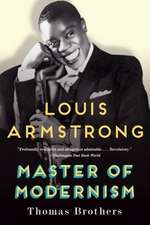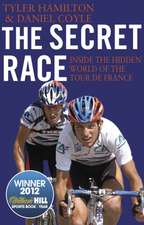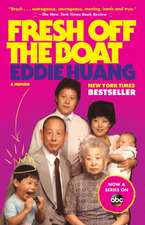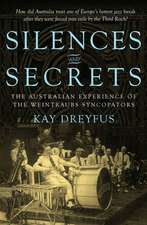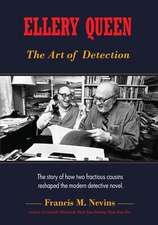You Just Fight for Your Life: The Story of Lester Young
Autor Frank Büchmann-Mølleren Limba Engleză Paperback – 21 ian 1990 – vârsta până la 17 ani
| Toate formatele și edițiile | Preț | Express |
|---|---|---|
| Paperback (1) | 181.39 lei 6-8 săpt. | |
| Bloomsbury Publishing – 21 ian 1990 | 181.39 lei 6-8 săpt. | |
| Hardback (1) | 440.03 lei 6-8 săpt. | |
| Bloomsbury Publishing – 21 ian 1990 | 440.03 lei 6-8 săpt. |
Preț: 181.39 lei
Nou
Puncte Express: 272
Preț estimativ în valută:
34.71€ • 36.24$ • 28.73£
34.71€ • 36.24$ • 28.73£
Carte tipărită la comandă
Livrare economică 05-19 aprilie
Preluare comenzi: 021 569.72.76
Specificații
ISBN-13: 9780313360565
ISBN-10: 0313360561
Pagini: 298
Dimensiuni: 156 x 235 x 23 mm
Greutate: 0.48 kg
Editura: Bloomsbury Publishing
Colecția Praeger
Locul publicării:New York, United States
ISBN-10: 0313360561
Pagini: 298
Dimensiuni: 156 x 235 x 23 mm
Greutate: 0.48 kg
Editura: Bloomsbury Publishing
Colecția Praeger
Locul publicării:New York, United States
Notă biografică
FRANK BUCHMANN-MOLLER is a Danish Jazz Musician who appears regularly with his own quartet as well as other groups. A Librarian at Odense University, he has received research grants from the Danish Research Council for the Humanities, the Danish Music Council, and the Funan Association of Jazz Musicians.
Cuprins
Foreword by Lewis PorterPrefaceChildhood and Adolescence (1909-1928)On His Own Two Feet (1928-1933)The Kansas City Years (1933-1936)With Count Basie (1936-1940)The War Years (1941-1944)Private 39729502 Young (1944-1945)Busy Years as Bandleader and Soloist (1946-1955)The Last Years (1956-1959)AppendixesIndex
Recenzii
This is the first thoroughgoing biography of one of America's greatest musicians; its fascination for at least jazz aficionados is magnetic..Along with Porter's magisterial work of musical analysis, Lester Young, this is the book to have on the most influential jazzman between Armstrong and Parker
A fascinating and invaluable compilation of raw material.a straightforward, accurate narrative.
A Danish musician here presents the most accurate, comprehensive work on a major figure in American jazz: Lester Willis Young (1909-1959), better known as `Pres' or `Prez,' from the nickname `President' given to him by Billie Holiday. Based on interviews with Young's colleagues and friends, and often presenting his own vulgar scatological words, the book faithfully chronicles the ups and downs of his life and career. Despite his alcoholism, drug addiction, syphillis, epilepsy, and emotional disturbances, Young became the outstanding tenor saxophonist of his time and a dominant, profound influence on the development of bop and progressive (`cool') jazz in the 1940s. His solos with the bands of Fletcher Henderson and Count Basie and his collaboration with Holiday are recalled in this outstanding biography.
A Danish musician here presents the most accurate, comprehensive work on a major figure in American jazz: Lester Willis Young (1909-1959), better known as 'Pres' or 'Prez,' from the nickname 'President' given to him by Billie Holiday. Based on interviews with Young's colleagues and friends, and often presenting his own vulgar, scatological words, the book faithfully chronicles the ups and downs of his life and career. Despite his alcoholism, drug addiction, syphilis, epilepsy and emotional disturbances, Young became the outstanding tenor saxophonist of his time and a dominant, profound influence on the development of bop and progressive ('cool') jazz in the 1940s. His solos with the bands of Fletcher Henderson and Count Basie and his collaboration with Holiday are recalled in this outstanding biography. Publisher's Weekly This is the first thoroughgoing biography of one of America's greatest musicians; its fascination for at least jazz aficionados is magnetic..Along with Porter's magisterial work of musical analysis, Lester Young, this is the book to have on the most influential jazzman between Armstrong and Parker.
Lester Young has been called the most influential jazz musician between Louis Armstrong and Charlie Parker, yet this biography of the late saxophonist joins only two or three others on the subject. The author has examined recordings, periodicals, and military records and has interviewed Young's surviving associates to illustrate how Young's work with Count Basie and others led to a career at once celebrated and plagued by Young's chemical dependencies until his death in 1959. Jazz enthusiasts will enjoy a touching tale well told, and researchers may benefit from the appendexes lisiting Young's bandsmen and his professional jobs and engagements over the decades.
First volume of the big, warm book about Lester Young that swing lovers have been waiting for, written by a Danish jazz musician. This rich, authentic life of one of the three greatest tenor players who ever lived, much of it told in vivid quotation from eyewitnesses. Nicely paced, it sketches in depth Lester's family background in Louisiana, his father's rather amazing musicianship (he played all the families of instruments), his mother's piano playing, and the family's travels on the road playing gigs all over the South. Lester rarely practiced, was a genius who could play anything he heard, as well as blow 60 choruses on any piece without repeating himself while building on what had gone before. Young Lester's great Kansas City cutting session with Coleman Hawkins, then the most feared tenor alive, with Lester, Ben Webster, and Herschel Evans ganging up on the Hawk for an all-night, all-morning battle royal, found Lester cutting Hawkins--and musicians over the whole country soon knowing about it. The story of his platonic friendship with Billie Holiday and great sessions backing her is spelled out in luscious detail, as are early band years with Count Basie, Fletcher Henderson and others, his postwar tours with Jazz at the Philharmonic, years abroad, his alcoholism and pot addiction, and his WW II court-marital for possession, and subsequent ten-month incarceration. To be most keenly relished throughout, however, is the author's attention to Lester's musicianship, his reed, horns, tone, inventiveness, and spirit, a quality that is like a second character. The page with him blowing `I Can't Get Started' at Charlie Parker's memorial is not to be missed. Matchless, four star satisfaction. This book, by a professional musician and librarian at the Odense University Library in Denmark, is a tour de force, a remarkable and unqualified success. The author's painstaking research has made possible a detailed and chronological account of Lester Young's life. This in itself is a first, and thoroughly rewarding. . . . A valuable appendix lists all Lester's known engagements. And the translation by John Irons is in good, unpretentious English. JazzTimes
Speaking of influence, no other instrumentalist of the swing era had as great an impact upon the subsequent period, that of bebop, the first expression of so-called modern jazz, as did the tenor saxophonist whose life is examined in meticulous detail by Danish researcher Frank Buchmann-Moller in You Just Fight For Your Life: The Story of Lester Young (Greenwood Press). A companion volume, You Got To Be Original, Man! The Music of Lester Young (Greenwood), is an exhaustive study of Prez's solos on record and a discography.
For an exhaustive examination of jazz musician Lester Young's life, this is a must.As a historical document of jazz in the first half of the century, Fight does provide a great deal of background information on jazz musicians, as well as highly in-depth discussions of Young's craft. Among the more interesting sections are the early chapters on Lester's early life, and his early grounding in music.the anecdotes are eye-opening and energetic.
You Just Fight For Your Life is meticulously researched with previously unpublished material. It is the wealth of first hand primary sources which makes this book so valuable in interpreting the life of Lester Young. Congratulations are in order for Frank Buchmann-Moller for a truly outstanding biography.
A fascinating and invaluable compilation of raw material.a straightforward, accurate narrative.
A Danish musician here presents the most accurate, comprehensive work on a major figure in American jazz: Lester Willis Young (1909-1959), better known as `Pres' or `Prez,' from the nickname `President' given to him by Billie Holiday. Based on interviews with Young's colleagues and friends, and often presenting his own vulgar scatological words, the book faithfully chronicles the ups and downs of his life and career. Despite his alcoholism, drug addiction, syphillis, epilepsy, and emotional disturbances, Young became the outstanding tenor saxophonist of his time and a dominant, profound influence on the development of bop and progressive (`cool') jazz in the 1940s. His solos with the bands of Fletcher Henderson and Count Basie and his collaboration with Holiday are recalled in this outstanding biography.
A Danish musician here presents the most accurate, comprehensive work on a major figure in American jazz: Lester Willis Young (1909-1959), better known as 'Pres' or 'Prez,' from the nickname 'President' given to him by Billie Holiday. Based on interviews with Young's colleagues and friends, and often presenting his own vulgar, scatological words, the book faithfully chronicles the ups and downs of his life and career. Despite his alcoholism, drug addiction, syphilis, epilepsy and emotional disturbances, Young became the outstanding tenor saxophonist of his time and a dominant, profound influence on the development of bop and progressive ('cool') jazz in the 1940s. His solos with the bands of Fletcher Henderson and Count Basie and his collaboration with Holiday are recalled in this outstanding biography. Publisher's Weekly This is the first thoroughgoing biography of one of America's greatest musicians; its fascination for at least jazz aficionados is magnetic..Along with Porter's magisterial work of musical analysis, Lester Young, this is the book to have on the most influential jazzman between Armstrong and Parker.
Lester Young has been called the most influential jazz musician between Louis Armstrong and Charlie Parker, yet this biography of the late saxophonist joins only two or three others on the subject. The author has examined recordings, periodicals, and military records and has interviewed Young's surviving associates to illustrate how Young's work with Count Basie and others led to a career at once celebrated and plagued by Young's chemical dependencies until his death in 1959. Jazz enthusiasts will enjoy a touching tale well told, and researchers may benefit from the appendexes lisiting Young's bandsmen and his professional jobs and engagements over the decades.
First volume of the big, warm book about Lester Young that swing lovers have been waiting for, written by a Danish jazz musician. This rich, authentic life of one of the three greatest tenor players who ever lived, much of it told in vivid quotation from eyewitnesses. Nicely paced, it sketches in depth Lester's family background in Louisiana, his father's rather amazing musicianship (he played all the families of instruments), his mother's piano playing, and the family's travels on the road playing gigs all over the South. Lester rarely practiced, was a genius who could play anything he heard, as well as blow 60 choruses on any piece without repeating himself while building on what had gone before. Young Lester's great Kansas City cutting session with Coleman Hawkins, then the most feared tenor alive, with Lester, Ben Webster, and Herschel Evans ganging up on the Hawk for an all-night, all-morning battle royal, found Lester cutting Hawkins--and musicians over the whole country soon knowing about it. The story of his platonic friendship with Billie Holiday and great sessions backing her is spelled out in luscious detail, as are early band years with Count Basie, Fletcher Henderson and others, his postwar tours with Jazz at the Philharmonic, years abroad, his alcoholism and pot addiction, and his WW II court-marital for possession, and subsequent ten-month incarceration. To be most keenly relished throughout, however, is the author's attention to Lester's musicianship, his reed, horns, tone, inventiveness, and spirit, a quality that is like a second character. The page with him blowing `I Can't Get Started' at Charlie Parker's memorial is not to be missed. Matchless, four star satisfaction. This book, by a professional musician and librarian at the Odense University Library in Denmark, is a tour de force, a remarkable and unqualified success. The author's painstaking research has made possible a detailed and chronological account of Lester Young's life. This in itself is a first, and thoroughly rewarding. . . . A valuable appendix lists all Lester's known engagements. And the translation by John Irons is in good, unpretentious English. JazzTimes
Speaking of influence, no other instrumentalist of the swing era had as great an impact upon the subsequent period, that of bebop, the first expression of so-called modern jazz, as did the tenor saxophonist whose life is examined in meticulous detail by Danish researcher Frank Buchmann-Moller in You Just Fight For Your Life: The Story of Lester Young (Greenwood Press). A companion volume, You Got To Be Original, Man! The Music of Lester Young (Greenwood), is an exhaustive study of Prez's solos on record and a discography.
For an exhaustive examination of jazz musician Lester Young's life, this is a must.As a historical document of jazz in the first half of the century, Fight does provide a great deal of background information on jazz musicians, as well as highly in-depth discussions of Young's craft. Among the more interesting sections are the early chapters on Lester's early life, and his early grounding in music.the anecdotes are eye-opening and energetic.
You Just Fight For Your Life is meticulously researched with previously unpublished material. It is the wealth of first hand primary sources which makes this book so valuable in interpreting the life of Lester Young. Congratulations are in order for Frank Buchmann-Moller for a truly outstanding biography.
